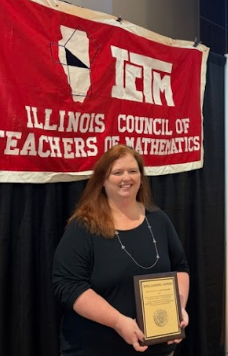Georgia voting bill rattles OPRF
On March 30, Georgia Republicans passed a bill that largely altered the state’s voting system. S.B. 202 will go into effect on Jan. 1, 2022.
New restrictions include, but are not limited to: requiring photo identification at any primary, general, or runoff election; lowering the amount of absentee ballot drop boxes in Georgia’s most populous counties from 94 in 2020 to 23 in 2022; and prohibiting the sale or distribution of food and drink outside of polling places.
Following the 2020 election, reforms were made to “make it easier to vote and harder to cheat,” said Georgia Gov. Brian Kemp in a statement to the New York Times. Kemp, who signed the bill into law, is a republican.
However, many members of the Oak Park community have banded together against the bill. “A lot of people seemed very, very surprised when this legislation passed,” said Ollie Saville, president of Youth Action in Civics (YAC). “We’re seeing that all of these seemingly small changes add up into a really big problem.”
Under the new measures, the decrease in absentee ballot drop boxes in the counties that cover Atlanta’s metropolitan area, including Cobb; DeKalb; and Fulton counties, by 2022 is about 76 percent. 2019 Census data reported that approximately 1.064 million people live in Fulton county.
Absentee ballot boxes in Fulton County specifically will be lowered from 38 to 8 by 2022, a 79 percent decrease. America experienced a sharp increase in absentee ballot requests in 2020, especially given the scale of the coronavirus pandemic. During the pandemic, however, racial disparities are prevalent in people susceptible to the virus.
The Centers for Disease Control and Prevention (CDC) reported in a study conducted throughout March and April of 2020 that 79 percent of African-Americans in Metro Atlanta who contracted COVID-19 were hospitalized, compared to 13 percent of white people.
“With COVID hitting POC communities so hard, on top of the protests that had occurred last summer, voting has most definitely been made more difficult for minority communities,” said Octavia Ikard, a member of BLU. Months of nationwide protesting in the summer of 2020 followed the murder of George Floyd in Minneapolis.
An analysis from Pew Research Center concluded that the number of black registered voters in Georgia increased by about 130,000 between Oct. 11, 2016, and Oct. 5, 2020. By Oct. 30, some 1 million black voters had cast their ballots early, compared to about 712,000 in October 2016, a Reuters poll said.
“After this election, Georgia became a different type of swing state where people didn’t understand that democrats were coming out of the woodwork,” Saville said. “Trying to mitigate that became ‘Let’s pass legislation that makes it harder for people to vote’ under the guise of ‘Let’s make it more efficient.’”
“When I started reading the requirements, I thought it was very basic and didn’t really have a problem,” said senior Kaleigh Clarke, president of Black Leaders Union (BLU). “ I (eventually) saw that (specific requirements were) connected to discrimination and could lead to more probems in underprivileged communities.” Some people, Clarke said, don’t have access to IDs, which limits the amount of people who can get out and vote.
State and voter identification cards are free in Georgia, and can be delivered by mail within 30 days. However, additional documents such as birth certificates and passports are required to obtain an ID.
In Georgia, there is a 25 dollar fee to obtain a birth certificate. The U.S. Department of State’s Bureau of Consular Affairs lists a 140 dollar fee to apply for a passport book and card, along with a 35 dollar execution fee.
An analysis from the American Civil Liberties Union (ACLU) concluded that more than 21 million Americans do not have government-issued IDs, and a disproportionate number of these Americans are low-income and/or racial and ethnic minorities.
In Illinois, voters do not need to present photo identification to vote – utility bills, social security cards, or any other documents showing a name and address can also be used as forms of identification. Those who cannot present a valid form of identification while voting can cast a provisional ballot, although any issues requiring the use of a provisional ballot must be resolved before the vote can count.
“The first thing we can do is get educated, know what’s going on,” Saville said. “There’s always the option of looking into our own state legislature … we can write letters to congresspeople, to senators, saying ‘let’s fight against this.’” Saville also worked as an election judge in the 2020 election.
“I turned 18 in late November, so unfortunately I couldn’t vote,” she said. “But being an election judge helped me understand the importance of voting … and allowed me to develop my own beliefs and ideas about why voting is important.”
For us teens, learning how to vote is important and empowering. In the coming years, many of us will be moving out of Illinois, and having the political tools that come with voting and awareness of the inequities in Georgia helps us become better citizens. YAC’s set of values “revolves around being bipartisan and providing a space for youth to figure out what they’re passionate about,” Saville said.






